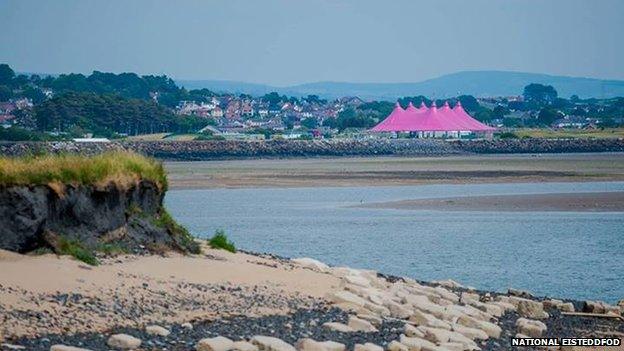Embracing the eisteddfod without speaking Welsh
- Published
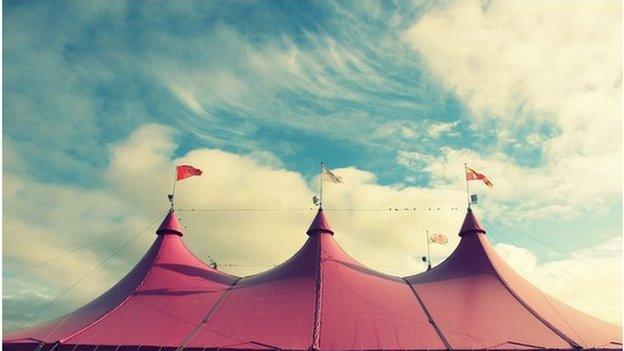
This year's National Eisteddfod in Powys started with an opening ceremony on Friday night
"Who's Allan?" she asked with a wry smile, "and why is he being asked to leave?"
The local photographer was on her first visit to the National Eisteddfod site and had spotted several large exit signs and the prominent Welsh translation, "Allan".
It was 2010 and the festival had rolled into Ebbw Vale in Blaenau Gwent, the area of Wales with the lowest proportion of Welsh speakers.
Like many of her non-Welsh speaking neighbours, the photographer embraced the eisteddfod's ancient ceremonies and quirky sights, filling her newspaper with images of druids in their robes, teenage clog dancers and day-trippers eating ice creams.
But attending the eisteddfod can be a daunting, sometimes intimidating prospect if you do not speak Welsh, regardless of recent efforts to broaden its appeal.
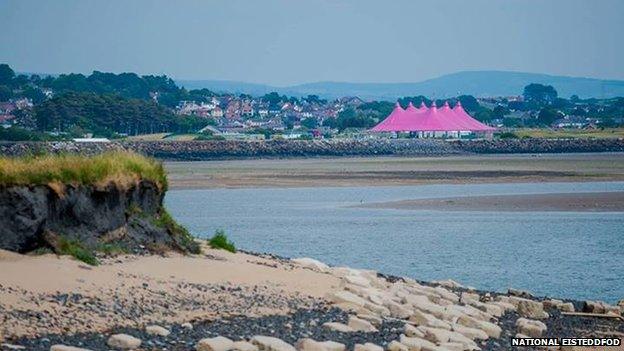
The National Eisteddfod was in Llanelli in 2014 for the sixth time
The exit signs are often the only visible English words on the site, and even English-language television and radio coverage of the event will be peppered with Welsh words such as 'Maes' (the festival site) and 'Gorsedd' (the bardic circle).
To some, the idea of making the eisteddfod more appealing to non-Welsh speakers is anathema, in case it increases the presence of English during a week-long celebration of Welsh-speaking Wales.
Many Welsh-speakers do embrace the chance to introduce their monoglot friends to the festival. But a core of linguistic purists fear there will be a watering-down of their annual opportunity to be immersed in the Welsh language, while English remains the dominant force beyond the eisteddfod's perimeter fence.
So the organisers have adopted a softly-softly approach to increasing the event's appeal among potential visitors who will not understand what is being spoken or sung, and who fear being frowned upon if they ask for their ice cream in English.
There are guided tours for first-timers, simultaneous translation equipment to follow the main events, and English programmes. Even the ice cream sellers will accept orders in English, though a "diolch" (thank you) will always be well received.
And once the linguistic barriers have been breached, there is plenty to enjoy: striking visual art, seemingly endless performances by talented soloists, massed choirs and famous faces, and compelling displays of modern and traditional dance and drama.
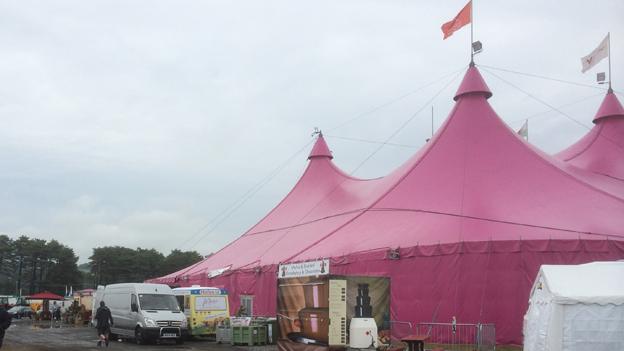
The Pink Pavilion is a familiar sight on the eisteddfod's Maes
In any language, the awarding of the eisteddfod crown and chair provides a remarkable ceremonial spectacle, while the annual induction of Welsh people into the Gorsedd of the Bards - an elite club of talented individuals dressed in colourful robes - is a dignified celebration of their achievements.
The "Lle Celf" (the Art Pavilion) is Wales' premiere exhibition space, and winning its gold medal is the pinnacle of Welsh artistic achievement, while other ceremonies honour the nation's greatest poets, dramatists and scientists throughout the week.
For fear of over-indulging on cultural offerings, a feast of craft stalls, exhibition spaces and fringe events can be found spread across the festival site and in the pubs and clubs of the nearest villages. It can be gorged upon in 24 hours, or absorbed sparingly over the eight days the Eisteddfod is in town.
The eisteddfod is an undeniably and unrepentantly Welsh-speaking event. But it has worked hard to discard its intimidating image among non-Welsh speakers, with a big "croeso" (welcome) awaiting all of its visitors this year, whatever language they speak.

Eisteddfod events
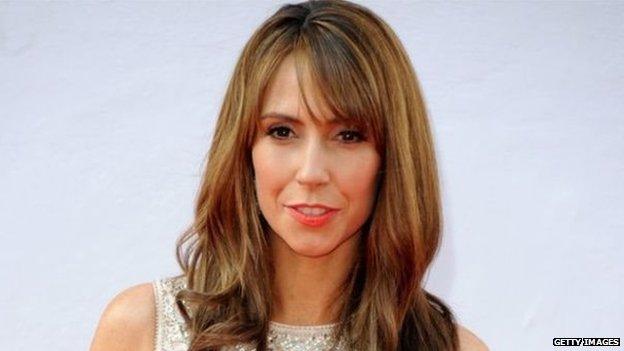
Alex Jones spoke English at home but attended Welsh-speaking schools in Carmarthenshire
Gorsedd Circle - Monday and Friday
New members of the order of druids are inducted during a ceremony at the stone circle on the Maes. This year's contingent will include the TV presenter Alex Jones and WRU president Dennis Gethin, as well as the winners of the main competitions at last year's Eisteddfod.
Crowning Ceremony - Monday
At 16:30 BST in the Pavilion, the Archdruid will present a specially-made crown to the winner of a work written in pryddest, a type of free verse poetry. However, the crown will not be awarded if the judges deem none of the entries to be worthy winners.
Prose Medal Ceremony - Wednesday
First awarded in 1937, the medal is given for a work of prose. Its previous winners include the writer Mererid Hopwood and the journalist and broadcaster Dylan Iorwerth.
Chairing Ceremony - Friday
The eisteddfod's main event happens on Friday afternoon, when the prestigious chair is presented for a poem written in strict meter known as cynghanedd. A new chair is carved for every Eisteddfod, and its winner is known as the Prifardd, or Chief Bard.

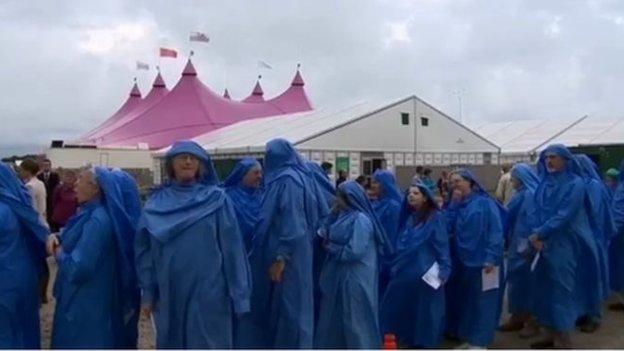
The Gorsedd of the Bards are an elite club of talented individuals dressed in colourful robes
Eisteddfod terms
Archdderwydd - the Archdruid. The presiding official of the Gorsedd of the bards, currently Christine James.
Y gadair - the chair. Awarded during the eisteddfod's most prestigious ceremony on Friday.
Coron - the crown. Presented on Monday afternoon to the writer of the best free-verse poem.
Cylch yr orsedd - Gorsedd Circle. The stone circle where ceremonies take place to welcome new members of the Gorsedd.
Maes - the eisteddfod field. Where you will find all of the main activity, including the pink pavilion and the Gorsedd Circle. This year's Maes is at Mathrafal Farm in Meifod, Powys.
Prifwyl - the main festival. A term regularly used by Welsh-speakers to describe the eisteddfod, the highlight of the cultural calendar.
Prifardd - chief bard. An honorary title assigned to a winner of an eisteddfod chair.
- Published31 July 2015
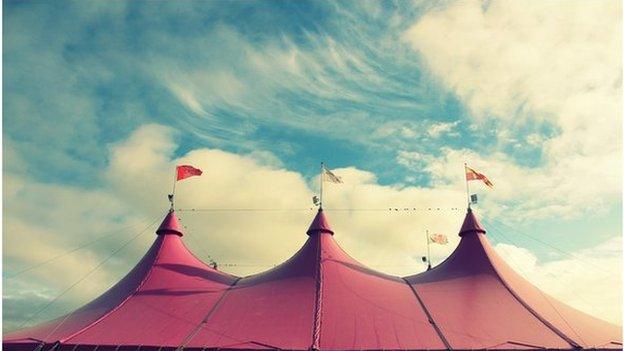
- Published2 August 2014
